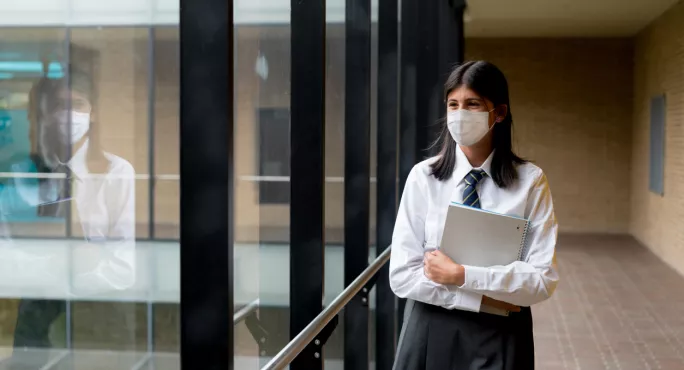Heads ‘disappointed’ at no vaccine for 12 to 15s

Headteachers have said they are “disappointed” by the decision of the Joint Committee on Vaccination and Immunisation (JCVI) not to recommend Covid-19 vaccines for pupils aged between 12 and 15.
The decision, announced today, will make it more difficult to prevent Covid disruption to education during the autumn term and beyond, school leaders have said.
Ministers could still decide to approve vaccines for this age group and are now expected to seek extra advice on the wider benefits of vaccinating 12- to 15-year-olds.
This could include the potential for cutting lost education time due to Covid-related absences.
But headteachers have warned that schools need a decision now.
News: Covid jabs not recommended for all 12- to 15-year-olds
Vaccines: Government urged to give jabs to pupils over the age of 12
Schools: Sajid Javid says schools could play role in vaccinating 16- and 17-year-olds
Reacting to the JCVI announcement, Geoff Barton, general secretary of the Association of School and College Leaders, said: “We are pleased that coronavirus vaccinations will be offered to more children with health vulnerabilities and welcome the extra reassurance this will give to these young people and their families.
“However, we are disappointed that the JCVI has decided against recommending Covid vaccinations in general to children aged between 12 and 15.”
Covid vaccine ‘could help to keep children in schools’
He said that the ASCL understood the decision had been made following an assessment of the balance of risks, and “all the available evidence”, and respected the decision.
But he added that this would make it more difficult to prevent disruption to pupils’ schooling over the next academic year.
“Nevertheless, the upshot is that this would make it more difficult during the autumn term and beyond to guard against educational disruption caused by transmission of the virus,” Mr Barton said.
“We are therefore pleased that the door appears to have been left at least partially open as the government looks at wider issues including disruption to schools. The trouble is that time is pressing, the autumn term is upon us and we really do need a decision.
“In the meantime, it is now even more important that the government does everything possible to provide support to schools and colleges to manage this situation and keep children in class.
“As it stands, the government has removed the main safeguards that were in place last academic year, and we would repeat our warning that it must keep the situation under close review and be ready to act if there is a significant increase in cases.
“We simply cannot have another term in which there is major educational disruption. It is not fair on pupils and their families or on the schools and colleges which are trying so hard to support them.”
And teachers’ leaders said the decision not to vaccinate younger secondary students made putting additional safety measures in place in schools even more important.
Kevin Courtney, joint general secretary of the NEU teachers’ union, said: “The decision by JCVI today will be considered by chief medical officers of the four nations next week, who will be able to take into account the wider issues of disruption to education and wider community transmission.
“If the decision not to vaccinate is upheld by the chief medical officers, this makes additional safety mitigations in schools all the more important.
“Sadly, in taking away so many safety measures last term, without replacing them with others, the government has left schools open to another rise in case counts - which will mean many children and staff missing school if they test positive.”
Register with Tes and you can read two free articles every month plus you'll have access to our range of award-winning newsletters.
Keep reading with our special offer!
You’ve reached your limit of free articles this month.
- Unlimited access to all Tes magazine content
- Save your favourite articles and gift them to your colleagues
- Exclusive subscriber-only stories
- Over 200,000 archived articles
- Unlimited access to all Tes magazine content
- Save your favourite articles and gift them to your colleagues
- Exclusive subscriber-only stories
- Over 200,000 archived articles